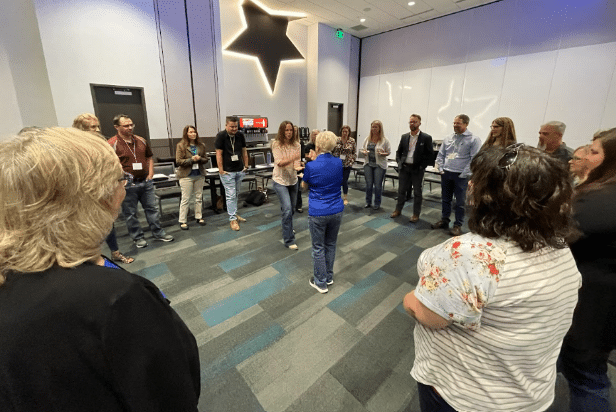Building and managing high-performing work teams is incredibly important. These teams thrive on effective communication, collaboration, and a shared focus on achieving business goals. Drawing insights from improvisational theater, known as improv, can significantly improve team dynamics and create a culture of creativity in problem solving and innovation. In this article, we will explore how incorporating improv insights can contribute to building and managing high-performance teams.
Characteristics of High-Performance Work Teams
Team Purpose, Goals, and Roles
High-performing teams are driven by a shared purpose and a clear set of short-term and long-term goals. Each team member understands their role and responsibilities, which enhances overall team potential. Additionally, setting “stretch” goals that challenge team members further can serve as a powerful motivator.
Talent, Skills, and Work Ethic
Building high-performance teams starts with recruiting and retaining top talent. Complementary skills, commitment to excellence, candor, and mutual respect are essential traits for team members. Leaders must ensure a sustained focus on performance and accountability at both the individual and team levels.
Incentives, Motivation, and Efficacy
A combination of monetary and non-monetary incentives encourages high performance in the short term. However, intrinsic motivators, such as personal satisfaction and interesting projects, have a more significant impact on long-term performance. Encouraging self-belief and strategic risk-taking also contribute to team success.
Leadership
Effective high-performing teams are usually led by strong leaders who keep the purpose and goals relevant and meaningful. They build commitment, enhance team members’ skills, and remove obstacles hindering performance. These leaders prioritize results that benefit the organization and each individual.
Conflict and Communication
Conflict management is an essential aspect of high-performance teams. Open communication and coaching instead of directing enable members to address issues candidly. Consistent, open lines of communication foster motivation, maintain interest, and promote cooperation.
Power and Empowerment
Empowered teams foster ownership, skill development, and decision-making. Striking a balance between providing decision-making boundaries and empowering individuals is crucial for team success.
Norms and Standards
High-performance teams establish norms that promote open communication, early conflict resolution, regular evaluation of individual and team performance, respect among members, a supportive team environment, and a strong work ethic focused on results.
Stages of Team Development
High-performance teams go through stages of development, as outlined by Dr. Bruce Tuckman’s model: forming, storming, norming, and performing. These stages help leaders and team members understand the evolution of group dynamics and how to manage their development effectively.
Forming
This is the initial period of team formation , it is a critical phase as team members acquaint themselves with one another, understand the team’s goals, and adapt to each other’s working styles. Building strong working relationships and fostering effective communication will take time but is essential for the team to function cohesively.
During this stage, encourage team members to share their unique perspectives openly. Embrace diversity and acknowledge that different viewpoints enrich the team’s creativity and problem-solving abilities.
Storming
In the storming stage, conflicts may arise as team members adjust to each other’s working styles. Use improv techniques to address conflicts positively and collaboratively. Focus on finding common ground and turning disagreements into opportunities for growth.
Norming
As the team begins to settle into its roles, prioritize building cohesion and trust. Use improv games and exercises to strengthen team bonds and promote camaraderie among members.
Performing
In the performing stage, encourage spontaneity and creativity within the team. Allow team members to experiment with new ideas and approaches, fostering a culture of innovation and continuous improvement.
How to Build a High-Performance Team
with Improv Insights
- Cultivate a Playful Environment – Improv thrives on playfulness and creativity. Create a work environment that encourages experimentation and fosters a sense of fun and excitement. This will inspire team members to take risks and explore new solutions.
- Conduct Team-Building Improv Workshops – Organize team-building workshops that incorporate improv exercises. These workshops can help improve communication, trust, and collaboration among team members, leading to increased team cohesion and performance.
- Encourage Positive Reinforcement – In improv, performers support each other’s efforts with positive reinforcement. Implement a culture of recognition and celebrate team achievements, encouraging a supportive and encouraging atmosphere.
Benefits for Employees and Organizations
For both people and businesses, high-performance teams have several advantages. Teams with a shared objective have members that are committed, focused, and motivated. Their skill sets complement one another, and they work under supportive management that values performance and promotes open communication. This encourages a feeling of shared ideals and trust, which boosts effectiveness and productivity.
Benefits for Employees
- Focused and engaged with a shared goal.
- Complementary skill sets and supportive leadership.
- Motivated and invested in the team’s success.
- Greater efficiency and productivity.
Benefits for Organization:
- Enhanced knowledge and independence with flexibility.
- Employees are motivated to innovate and take risks.
- Improved client service.
- Increased overall engagement.
- Support for process change and specialized projects with an efficient task force.
How Improv Insights Elevate High-Performing
Work Teams?
Building and managing high-performing work teams with improv insights is a powerful strategy to foster a culture of creativity, collaboration, and innovation. By incorporating principles from improvisational theater, such as embracing spontaneity, promoting positive reinforcement, and encouraging active listening, teams can thrive in today’s dynamic business landscape.
High-performance teams, driven by a shared purpose, complementary skills, and strong leadership, are focused, engaged, and motivated to achieve their common goals. This leads to greater efficiency, productivity, and improved client service. Organizations benefit from empowered and innovative employees who contribute to successful process changes and specialized projects.
Embracing the principles of improv can create a playful and supportive environment that cultivates a high-performance team culture. Overall, leveraging improv insights offers a powerful approach to building and managing high-performance teams that drive success and growth for both employees and organizations alike.

